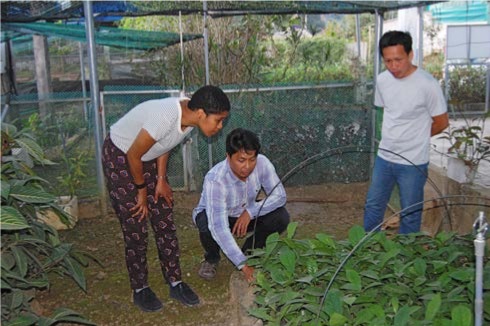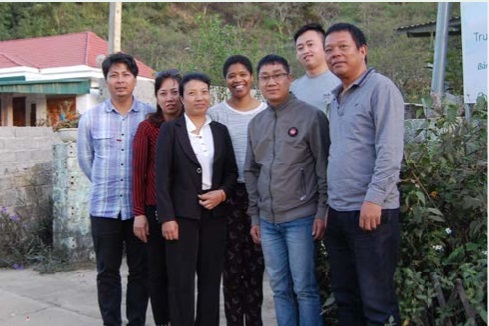Vietnam is recognized as one of the world's most biodiverse…

Climate adaptation in focus on new project by ADDA and PanNature
The poor part of Vietnam’s rural population – the ethnic minorities in particular feel the consequences of climate change, where extreme weather destroys their agricultural production. ADDA’s new project in Son La and Lai Chau provinces helps the small farmers in the areas to adapt their cultivation methods.

ADDA and partners have for a long period focused on training and information of poor rural communities in methods how to improve crop yields and earnings by using better farming practices. Our new project:
Strengthening the Voice and Capacity of Vulnerable Ethnic Minority Farmers in Climate Resilience in Northwest Vietnam (abbreviated VOF), together with PanNature -our Vietnamese partner organization, will continue and consolidate the many good results of the previous climate project: Climate Change and Ethnic Minorities. In that project we focused on strengthening agricultural resilience (resilience) to changing climate and weather conditions, as well as improving farmers’ skills in advocacy towards local authorities. We continue with these themes in the new VOF project.

general project manager, Mr. Thang – PanNature Project Coordinator, Mr. Liem – PanNature project employee, Mr. Thuong – ADDA employee for 20 years, photographer, driver, project employee etc.
A project of this type has many partners in order to lift the complex tasks. And we really benefit of ADDA’s many years of experience in corporation with partners. A project of this type begins with a thorough involvement of all the actors in the project and especially the local authorities in the selected provinces, as well as in the individual districts and municipalities. We have initial workshops and meetings with authorities in the two provinces of Son La and Lai Chau. And at village level with the Commune People’s Committee (CPC), which is the local administrative unit.
Happy reunion with local facilitators
Right now, the project is in the process of providing training for the local facilitators, who are taught in agroecology, as well as in participant-oriented training methods. The local facilitators play a key role in conducting training sessions and meetings with the Climate Committees in the individual villages On my recent visit to Son La Province, I attended a training session for the local facilitators and here I met Huong and Tran, both local facilitators. The two were also part of the CEMI Climate Project and have previously participated in other ADDA activities.
Huong hopes that the farmers in the villages will take good care of the climate adaptation models and be interested in using them in practice. Tran hopes that in the project they will gain a good dissemination of knowledge about the farmers’ opportunities to climate adapt their cultivation methods.
Both are happy to be part of the local development activity again in Lai Chau province and to help influence and assist the farmers in the villages with their climate change initiatives.
Partners in the provinces of Son La and Lai Chau
Local branches of the Vietnam Farmers Union (VNFU) in districts, municipalities and villages will be responsible for the many different activities together with ADDA’s main partner – PanNature. In this project, local farmers from the organization VNFU in Son La and Lai Chau Farmer Union will manage an implementation task, but they will also part of the target group. Their responsibilities are to plan and organize the many activities and make reporting. And in order to be able to solve these tasks, their competences in administrative work, member involvement, as well as agricultural knowledge about the climate’s effect on cultivation methods are strengthened.

With support from ADDA and PanNature, the various local departments will conduct advocacy activities towards provincial and national authorities. Training activities must, among other things, strengthen the participation of villagers in the planning of climate-friendly production plans and making value chain analyzes of relevant agricultural products. Measures that can promote the local communities’ overall earnings.
Finally, Tay Bac University (TBU) in Son La Province will be involved in the project. The TBU will be involved in the professional agricultural training and they will use the project in their research on climate change and their importance for agricultural production, the environment and the market conditions. We have previously conducted a project in cooperation with TBU, which has contributed with training courses for the local facilitators, as well as designing the professional content in farmer field school courses.
About PanNature
PanNature is together with ADDA the main partners in the project. PanNature is responsible for the implementation of the project and for achieving the desired goals.
Founded in 2004, the PanNature organization has since grown to become an innovative and change-oriented civil society organization, working broadly thematically and geographically in Vietnam. PanNature launches initiatives that promote good governance and transparency in the natural resources sector. And they actively participate in political discussions and provide analyzes and environmental assessments in relation to protected area management, biodiversity, forest management, mining, hydropower development and environmental taxation, etc. PanNature emphasizes being able to provide evidence-based research and analysis.
ADDA’s collaboration with PanNature started after a meeting in the Climate Change Group network in 2013. We quickly discovered the many common options for collaboration and in the fall of 2014, with the support of CISU’s Climate and Environment Fund, we started the project: “Climate Change and Ethnic Minorities in Northern Vietnam”. Over the years, we have developed good cooperation and together increased our knowledge and experience in working with climate adaptation in agriculture for ethnic minorities at local level in North Vietnam.
Having practical experience from the above project and a number of other projects with national and international partners, PanNature has gained extensive experience in capacity building and advocacy for ethnic minorities and other marginalized groups.
PanNature has a contact with many stateand international agencies, as well as donors, and has through these contacts gained access to major political events and policy makers at national level. Through their own news service, ThienNhien.Net, PanNature reaches a wide audience and has become well-known among environmental organizations, government agencies, and the media.



